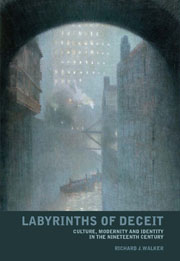Book contents
- Frontmatter
- Contents
- Acknowledgements
- Introduction: Tracing the fragments of modernity
- Part I (De)Generating doubles: duality and the split personality in the prose writing of James Hogg, Robert Louis Stevenson and Oscar Wilde
- Part II The stripping of the halo: religion and identity in the poetry of Alfred Tennyson, James ‘B. V.’ Thomson and Gerard Manley Hopkins
- Part III Infected ecstasy: addiction and modernity in the work of Thomas De Quincey, Alfred Tennyson, Christina Rossetti and Bram Stoker
- Introduction
- 8 A change in physical economy: Thomas De Quincey's confession
- 9 Coming like ghosts to trouble joy: Alfred Tennyson's ‘The Lotos Eaters’
- 10 Like honey to the throat but poison to the blood: Christina Rossetti's addictive market
- 11 The blood is the life: Bram Stoker's infected capital
- Conclusion: Ghost-script
- Notes
- Bibliography
- Index
9 - Coming like ghosts to trouble joy: Alfred Tennyson's ‘The Lotos Eaters’
from Part III - Infected ecstasy: addiction and modernity in the work of Thomas De Quincey, Alfred Tennyson, Christina Rossetti and Bram Stoker
- Frontmatter
- Contents
- Acknowledgements
- Introduction: Tracing the fragments of modernity
- Part I (De)Generating doubles: duality and the split personality in the prose writing of James Hogg, Robert Louis Stevenson and Oscar Wilde
- Part II The stripping of the halo: religion and identity in the poetry of Alfred Tennyson, James ‘B. V.’ Thomson and Gerard Manley Hopkins
- Part III Infected ecstasy: addiction and modernity in the work of Thomas De Quincey, Alfred Tennyson, Christina Rossetti and Bram Stoker
- Introduction
- 8 A change in physical economy: Thomas De Quincey's confession
- 9 Coming like ghosts to trouble joy: Alfred Tennyson's ‘The Lotos Eaters’
- 10 Like honey to the throat but poison to the blood: Christina Rossetti's addictive market
- 11 The blood is the life: Bram Stoker's infected capital
- Conclusion: Ghost-script
- Notes
- Bibliography
- Index
Summary
We hear it reported of Dryden, and of Fuseli in modern times, that they thought proper to eat raw meat for the sake of obtaining splendid dreams: how much better for such a purpose to have eaten opium, which yet I do not remember that any poet is recorded to have done, except the dramatist Shadwell: and in ancient days, Homer is, I think, rightly reputed to have known the virtues of opium.
Alfred Tennyson's ‘The Lotos Eaters’ is, given its limitations in terms of length, apparently a less fruitful source for representations of addiction – if indeed it can be read as such – than De Quincey's Confessions. Nonetheless, despite being a poem inspired by Homer's Odyssey (a text which actually plays a significant if not explicit role, certainly in terms of cultural location, in this work), it raises a series of issues that place the previous analysis of De Quincey into perspective, and which contribute significantly to a debate about addiction and the networks that circulate around it in the context of nineteenth-century literature, culture and modernity. The most immediately noteworthy issue is, once again, the spectral qualities possessed by drug and by addict, characteristics that possess a cumulative significance in this discussion. However, other important features re-emerge in the poem, with notions of nation and class again playing important parts in a consideration of addiction and intoxication.
- Type
- Chapter
- Information
- Labyrinths of DeceitCulture, Modernity and Identity in the Nineteenth Century, pp. 226 - 242Publisher: Liverpool University PressPrint publication year: 2008



